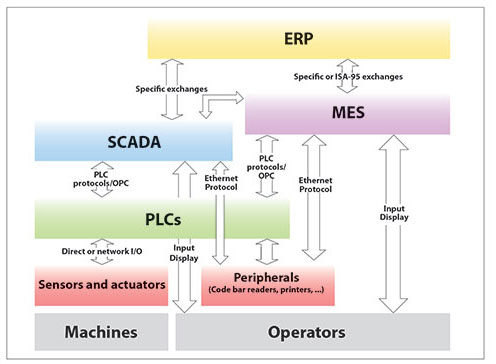
I don’t know. I’m in MES so I’m biased. No it will not. But if I were to look at it from a current reality and trend analysis, even a requirements analysis, I’d say maybe.
I don’t know. I’m in MES so I’m biased. No it will not. But if I were to look at it from a current reality and trend analysis, even a requirements analysis, I’d say maybe.
What is MES? Manufacturing Execution Systems (MES) in South Africa are based on computerised platforms that assist the manufacturing of products. The work in progress on equipment and machinery on the factory production floor is thus constantly monitored and information is recorded for analysis and evaluation.(Stolen from www.age.co.za).
What is OT? Operational Technology (OT) is a category of computing and communication systems designed to manage, monitor and control industrial operations, with a focus on the physical devices and processes they use. OT monitors and manages industrial process assets and manufacturing/industrial equipment. (Stolen from www.i-scoop.eu).
When I need to build relationships with plant guys, I do not differentiate MES from traditional IT, since traditional IT is what all of them know – computers and things. My go-to explanation is always, “It’s IT, just for your plant, designed and supported to your needs.” Traditionally MES features on the plant organogram just above the scada layer. The plant network is the de facto layer of IT that fetches plant data and streams it to the various MES systems, to feed and visualise the information to the enterprise levels above. In this depiction there is no MES. It’s IT and then it’s OT – interesting.
One can probably argue that OT might include MES, or it can operate simultaneously alongside the MES systems. I can subscribe to that definition, but at the same time, I feel it’s a waste of space and an unnecessary increase in complexity.

IT/OT convergence
MES has been at the helm of steering manufacturing data to the business for decades. OT is an advancement of MES, so, unless we box MES as specifically designed for certain manufacturing processes and outcomes, I see no future for dedicated MES teams or systems, unless those teams and systems adopt the methodologies of converging IT and OT on the plant floor. I have yet to see a company that has three different technology departments: IT, MES and OT.
Data is an important commodity in any manufacturing company since it opens up insights they never thought they had. Data drives value, and evolves from the bottom up into meaningful information. Just so, I think MES needs to evolve into OT. MES leaders can leverage the foundation they have already established, and bring the manufacturing plant closer to the IT offerings of corporate. Or should MES serve as the bridge from OT to IT?
In this article, I do not address the skills required, the differences in protocols, the differences in networked security requirements, or the types of technology, I merely throw an idea out there to the IT in manufacturing community. An idea that I think could either solve the convergence of IT and OT or force the evolution of MES to OT, or increase the scope of MES to include OT technology. Whichever it is, the requirement for a convergence of technologies for the value of manufacturing plants is increasing, and companies are not necessarily concerned about what we in the MES industry call it. They simply want solutions that will help them dive deeper into specialised systems they need to keep up with the demands Industry 4.0 is throwing at them.

Lance Turner is an MES specialist employed at Sasol’s Secunda plant. He has an honours degree in Information Systems with a focus on Enterprise Architecture design and solutions. A certified MESA MES/MOM student, his passion is amalgamating general IT across the manufacturing spectrum. Lance’s vision is for a converged IT and manufacturing discipline that will become the reality of Industry 4.0. His team motto is MES services that are always available, always stable, and always dependable.
For more information contact Lance Turner, Sasol,

© Technews Publishing (Pty) Ltd | All Rights Reserved